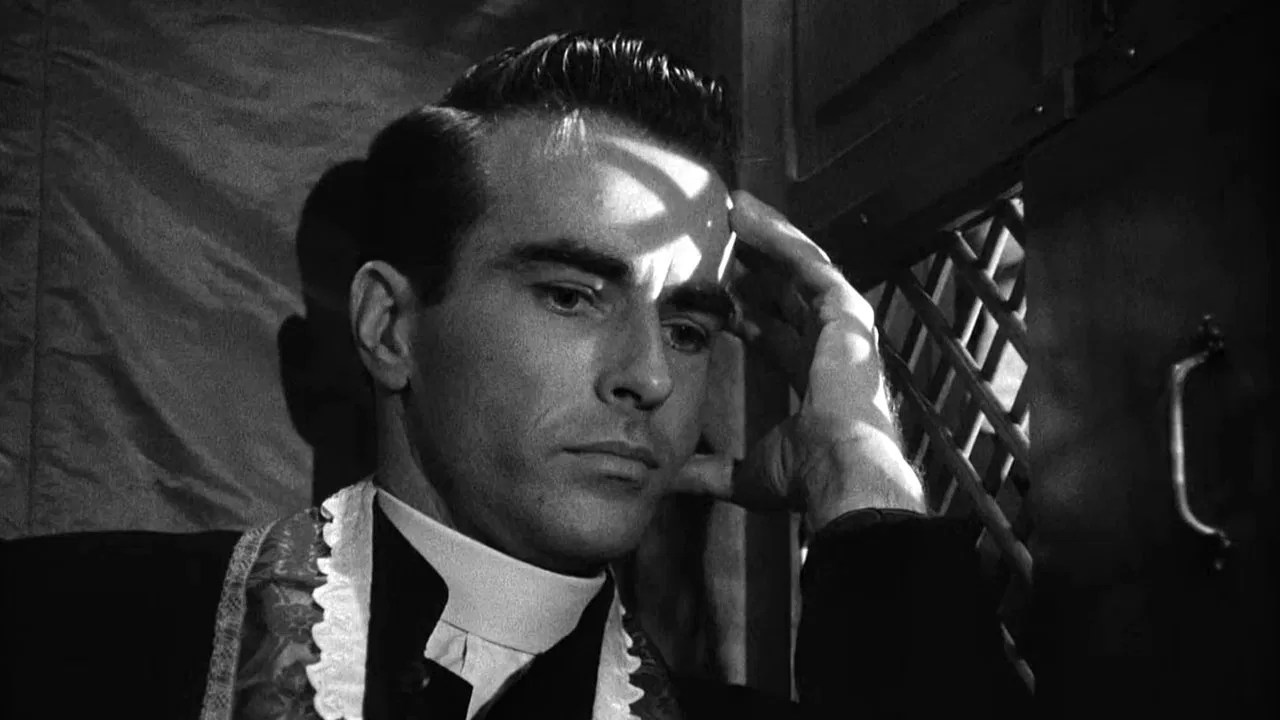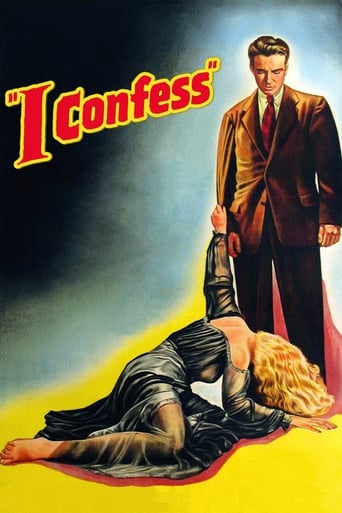

good back-story, and good acting
... View MoreAlthough it has its amusing moments, in eneral the plot does not convince.
... View MoreClever and entertaining enough to recommend even to members of the 1%
... View MoreAll of these films share one commonality, that being a kind of emotional center that humanizes a cast of monsters.
... View MoreSuspenseful and tense, but from the angle of devotion and duty rather than the usual Hitchcock style. Very well made and Clift pulls off the pained look masterfully. I doubt many people today could relate to the plot, but it worked for its time.
... View MoreThe narrative may seem very obvious. Super-handsome Montgomery Clift playing the reverent priest, Anne Baxter playing the lady in a love story setting up the classically impossible relationship between a man of the clergy and a modern woman, and a bit of story to buckle it all up. But no.This is a genuinely compelling crime, that keeps the viewer constantly interested in what the movie-makers have in store for them as the plot keeps moving forward with new elements to a very tension-laded core, that just seems to be heading more and more towards a breach of the threshold. Clift is very plain in his acting and puts in just the right, convincing performance as the lead role, but yet the movie is not just only him. It is rich with characters, with their own intentions and interest in the case, each pulling in a certain direction. It makes for a smooth viewing, and never turns indulgent of the love affair that is, yet, at the very center of the case. Strongly written, well directed Hitchock with a good casting.
... View MoreWhile I heard this wasn't great Hitchcock, it begins quite nicely with a look that at times is reminiscent of German Expressionism and at other times of Neo-realism. The set up is nice and the murderer is squirmingly unlikable. Outside of Dimitri Tiomkin's horribly bombastic score, it seemed promising.I'd say for maybe a half hour it's a decent movie, as you see Montgomery Clift if conflict and see Karl Malden getting suspicious. Unfortunately the movie starts lagging, and then, when you think it won't be great but might be okay, it gets really, really bad. First off there's Anne Baxter's *endless* deposition, a dull mix of voice-over and bland snippets that should have taken about 2 minutes but instead goes on for what seemed to be 15. That was bad, as was the unrealistic gusto with which the police chased very slim evidence. But the movie achieved ultimate levels of absurdity in the last couple of scenes, in which a character's actions come out of nowhere, a plot thread just kind of peters out without resolution, and no one does anything that makes much sense at all, although it does wrap things up in a neat, though very ugly, bow.I find it incredible that people here are reviewing this favorably. I feel they all need to have seen the movie without knowing it was by Hitchcock, because I can't help but think that they are giving it a pass because of the director.
... View MoreAs others have pointed out, "I Confess" is probably one of Alfred Hitchcock's lesser-known films, certainly when compared to the likes of "Psycho", "North by North-West" or "Vertigo". And yet in terms of quality I would rank it alongside those films; it certainly does not deserve to be relegated to the ranks of "lesser Hitchcock" together with something like, say, "Stage Fright" or "Torn Curtain". Perhaps the reason is that it does not contain what have come to be thought of as typical Hitchcock touches; there is very little humour and no set-piece "suspense" sequences. There are no typical "Hitchcock stars"; I suspect that it might have become better-known had it starred, say, James Stewart and Ingrid Bergman, or Gregory Peck and Grace Kelly, rather than Montgomery Clift and Anne Baxter, neither of whom made another film with Hitch. It has a "Hitchcock blonde" in the shape of Baxter, but her character is in many ways untypical of the director's female leads. One typically Hitchcock feature is its theme, that of a man wrongly accused of a crime, but there is an unusual twist. The hero is Father Michael Logan, a Catholic priest from Quebec. (Much of the filming was done on location in the city; in keeping with Hitchcock's fondness for landmark buildings the finale takes place in the famous Château Frontenac hotel). Father Logan finds himself coming under suspicion after a corrupt lawyer named Villette is found murdered. The link between them is that Villette was blackmailing Ruth, the wife of local politician Pierre Grandfort and an old girlfriend of Father Logan before he became a priest, and the police suspect that he killed Villette to protect his former lover. The twist is that Logan actually knows the identity of the killer. It was Otto Keller, a German immigrant and the husband of Logan's housekeeper Alma. (Is it coincidence that she has the same Christian name as Hitchcock's own wife?) The motive was robbery; it had nothing to do with Villette's blackmail of Ruth. Because Keller has formally confessed his guilt to Logan, however, the priest is bound by the "seal of the confessional" and cannot implicate Keller, even when he is himself arrested and charged with the crime, at that time a capital offence in Canada. The Hitchcock film with which "I Confess" has most in common is probably "The Wrong Man", which also showed how easily an innocent man could be suspected of a crime. Like that film it contains a court scene, something Hitchcock generally preferred to avoid. (It is said that he withdrew from directing "The Wreck of the Mary Deare" because he could see no way of making it except as a courtroom drama). There are also similarities with "Marnie", another film which relies more upon psychological drama than physical suspense. It is said that Hitchcock, who disliked "method" actors, did not enjoy working with Clift, and yet it is Clift's performance which is vital to the film's success. Logan is a man prepared to die rather than betray his religious beliefs and his priestly duties, something which in many people's eyes would make him a saint, and playing a character who is virtuous to the point of saintliness can often be a thankless task. With Clift, however, we are always aware that Logan is a flesh-and-blood human being, not a mere plaster saint. He combines well with O. E. Hasse as Logan's evil angel Keller, a man tormented by the fear that Logan will be unable to resist the temptation to betray him and who constantly goads the priest. Another good performance comes from Karl Malden as the investigating police officer Inspector Larrue, initially all too ready to believe Logan guilty on unsatisfactory evidence but belatedly converted to a belief in his innocence. As I said, Baxter is not a typical Hitchcock blonde. Ruth is a selfish and conniving woman quite unlike the innocent heroines played by Bergman, Kelly, Joan Fontaine and Eva Marie Saint. She remains obsessively in love with Logan even after he enters the priesthood. Some directors might have tried to win sympathy for her by making Pierre a bad husband, a bully or an adulterer or both, but in fact he is a decent man who loves his wife and his hurt by her failure to return that love. (Baxter was not Hitchcock's first choice for the role; he wanted the Swedish actress Anita Björk but Warner Bros vetoed her on the grounds that she was an unmarried mother). Hitchcock was himself a Catholic, and regarded this as his most "Catholic" film but felt that others might not understand it, saying "We Catholics know that a priest cannot disclose the secret of the confessional, but the Protestants, the atheists, and the agnostics all say, 'Ridiculous! No man would remain silent and sacrifice his life for such a thing!'" Well, I might be the director's namesake but am not his co-religionist, and yet even I had no difficulty in understanding how a man like Michael Logan might be prepared to sacrifice his life for his beliefs. The one weak point, I felt, was the handling of the trial scene, which concentrates too much on the prosecution evidence and not enough on the defence and then culminates in that unexpected "not guilty" verdict which allows much of the tension to dissipate. It would have been more effective, I felt, had the denouement come while Logan was still on trial or even after he had been convicted and was under sentence of death. With that exception, however, I would regard "I Confess" as one of its director's finest psychological dramas and a film that deserves to be better-known. 9/10
... View More